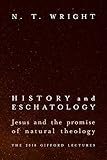History and eschatology : Jesus and the promise of natural theology / N.T. Wright.
Material type: TextSeries: Gifford lectures ; 2018Publisher: Waco, Texas : Baylor University Press ; London : spck, 2019Description: xxi, 343 pagine ; 24 cmContent type:
TextSeries: Gifford lectures ; 2018Publisher: Waco, Texas : Baylor University Press ; London : spck, 2019Description: xxi, 343 pagine ; 24 cmContent type: - volume (nc)
- 9781481309622
- 9780281081646
- 1481309625
- 210 23
- BL 183.W75 2019
| Item type | Current library | Call number | URL | Status | Notes | Barcode | |
|---|---|---|---|---|---|---|---|
 Corsi/Seminari
Corsi/Seminari
|
Biblioteca "Angelicum" Pont. Univ. S.Tommaso d'Aquino Temporary Library | BL 183.W75 2019 (Browse shelf(Opens below)) | Available | 0030222032 | |||
 eBook
eBook
|
Biblioteca "Angelicum" Pont. Univ. S.Tommaso d'Aquino Nuvola online | online - EBSCO (Browse shelf(Opens below)) | Online access | Not for loan | Accesso per gli utenti autorizzati / Access for authorized users | (ebsco)2267622 |
Browsing Biblioteca "Angelicum" Pont. Univ. S.Tommaso d'Aquino shelves, Shelving location: Nuvola online Close shelf browser (Hides shelf browser)

|

|

|

|

|

|

|
||
| online - EBSCO Paradiso / | online - EBSCO Purgatorio / | online - EBSCO Broken signposts : how christianity makes sense of the world / | online - EBSCO History and eschatology : Jesus and the promise of natural theology / | online - EBSCO The living Christ : the theological legacy of Georges Florovsky / | online - EBSCO Paul and the heritage of Israel : Paul's claim upon Israel's legacy in Luke and Acts in the light of the Pauline letters / | online - EBSCO The Trinity and theodicy : the Trinitarian theology of von Balthasar and the problem of evil / |
Includes bibliographical references (pages 319-332) and indexes.
I. Natural theology in its historical context -- 1. The fallen shrine : Lisbon 1755 and the triumph of Epicureanism -- 2. The questioned book : critical scholarship and the Gospels -- II. History, eschatology and apocalyptic -- 3. The shifting sand : the meanings of 'history' -- 4. The end of the world? : eschatology and apocalyptic in historical perspective -- III. Jesus and Easter in the Jewish world -- 5. The stone the builders rejected : Jesus, the Temple and the Kingdom -- 6. The new creation : resurrection and epistemology -- IV. The peril and promise of natural theology -- 7. Broken signposts? : new answers to the right questions -- 8. The waiting chalice : natural theology and the Missio Dei.
"History and Eschatology: Jesus and the Promise of Natural Theology represents the first Gifford delivered by a New Testament scholar since Rudolf Bultmann in 1955. Against Bultmann's dehistoricized approach, N. T. Wright argues that, since the philosophical and cultural movements that generated the natural theology debates also treated Jesus as a genuine human being--part of the "natural world"--there is no reason the historical Jesus should be off-limits. What would happen if we brought him back into the discussion? What, in particular, might "history" and "eschatology" really mean? And what might that say about "knowledge" itself? This lively and wide-ranging discussion invites us to see Jesus himself in a different light by better acquainting ourselves with the first-century Jewish world. Genuine historical study challenges not only what we thought we knew but how we know it. The crucifixion of the subsequently resurrected Jesus, as solid an event as any in the "natural" world, turns out to meet, in unexpected and suggestive ways, the puzzles of the ultimate questions asked by every culture. At the same time, these events open up vistas of the eschatological promise held out to the entire natural order. The result is a larger vision, both of "natural theology" and of Jesus himself, than either the academy or the church has normally expected".


